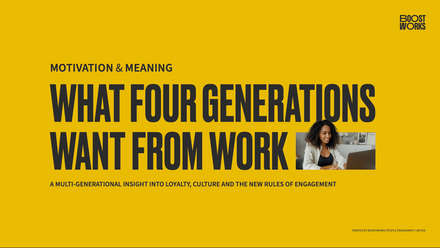Why autonomy, connection and mastery are among key rewards for a happy employee

It’s all too easy to look at the employee experience from the perspective of the employee lifecycle, focusing on how the employer can enhance each element. But for the employee experience to be positive and memorable, it’s their psychological needs that must be fulfilled.
Leaders must address the universal psychological needs of autonomy, connection and mastery if they’re to create transformative peak experiences for their people.
It starts with psychology
We all have basic needs that must be fulfilled and organisational psychology dictates that we have an innate drive toward growth and wellbeing. In the workplace, this manifests itself in employee motivations and behaviours that involve at least one of three basic needs – autonomy, connection and mastery.
Simply put, we are all drawn to work that promises a degree of ownership, a sense of belonging and an opportunity to meaningfully contribute to the success of the organisation, increasing our sense of usefulness. The most positive and satisfying employee experiences will fulfil all three basic psychological needs.
O.C. Tanner’s research finds that satisfying these needs produces a strong, positive emotional response that supercharges employees’ perceptions. Conversely, when a need is unmet, the opposite occurs — employee perceptions are negative and deflated.
Therefore, knowing what employees require at a basic psychological level must drive how leaders approach improving the employee experience. And if an employee experience strategy is not looking to improve employees’ sense of autonomy, connection or mastery, it needs to be reviewed.
The role of modern leadership and recognition
There are a several approaches leaders can take to create regular peak employee experiences that fulfil the needs of autonomy, connection and mastery. These include creating an organisational culture that nurtures and champions modern leadership and focusing on employee recognition.
Modern leadership must have mentorship, collaboration and humility at its heart, with a strong focus on leaders developing and advocating for their teams. This leadership approach is crucial for allowing employees to feel ownership of their work, part of a caring community and skilled and knowledgeable in their role.
Employee recognition also helps. For instance, by recognising employees’ efforts and results, this acknowledges ownership of work, directly connects employee contributions to a purpose, to their teams and to their leader and highlights their achievements. When recognition is taken one step further so that it’s integrated into everyday organisational culture, this will further increase the frequency of peak employee experiences.
In fact, the impact of employee recognition shouldn’t be underestimated as it increases the likelihood of autonomy satisfaction by 225%, connection satisfaction by 209% and mastery satisfaction by 201%.
Find the links
What employees psychologically need must always come first when addressing how to improve the employee experience. Leaders must find opportunities to link and leverage the three essentials of autonomy, connection and mastery, to ensure everyday experiences become truly memorable.
Author is David Watts, culture and engagement strategist, O.C. Tanner Europe.
This article is provided by O.C. Tanner Europe.
Supplied by REBA Associate Member, O. C. Tanner
The worldwide leader in employee recognition solutions that help people thrive at work.







